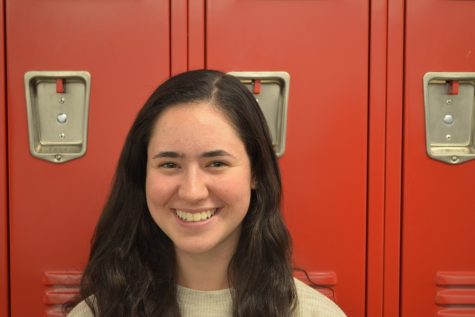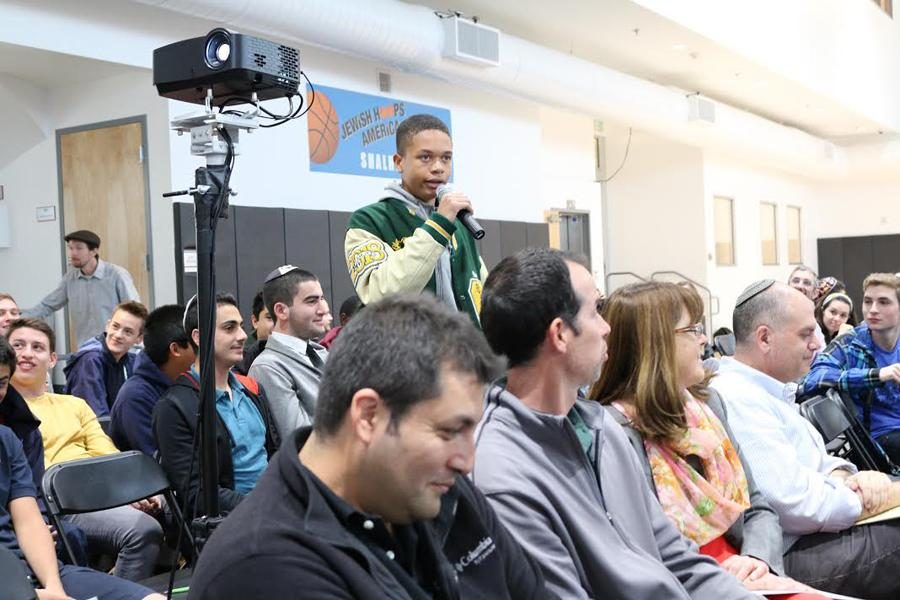Day of talking breaks tension between Glendale and Shalhevet football teams
Glendale sophomore Steve Dorsey shares his thoughts about whether “the ends justify the means” at Town Hall Dec.3.
By Maayan Waldman, Community Editor
On the morning of Dec. 3, religion and culture transformed from divisive boundaries to topics for conversations for flag football players from Shalhevet and Glendale Adventist Academy.
That morning, what had started as an anti-Semitic confrontation Oct. 25 at the annual Loma Linda flag football tournament became a catalyst for a learning experience for the Shalhevet team and its Seventh Day Adventist counterpart.
It all started when running back Nicholas Marcondez had jokingly — and regrettably, he later said — gestured “Heil Hitler” as Firehawks and Cougars exchanged hand-slaps at the end of Shalhevet’s last game in the tournament.
“I thought it was somewhat funny but I didn’t mean to offend anyone at all,” Nicholas said in an interview with The Boiling Point. “It showed I support Hitler, which I don’t. Hitler did many terrible things — to Jewish people, to homosexuals, and others.”
When it happened, Shalhevet seniors Boaz Willis and Noah Rothman responded by heading for the Firehawks’ van to rile up the Firehawks to confront Nicholas. Several boys yelled at him, and when Glendale Coach Athletics Director Chris Lindstadt saw the commotion, he stepped in and told Nicholas to apologize to the whole team.
Nicholas apologized, and in the following days, he was spoken to by his principal and coach several times about what happened, he told the Boiling Point. Since it was the last game of the season, he was not removed or suspended from the team.
After the incident, Shalhevet and Glendale faculty and administration communicated further, and together decided that the entire Glendale team would visit Shalhevet, hoping to turn it into something positive.
The program Dec. 3 consisted of an hour-long morning session in the Beit Midrash, part of which focused on anti-Semitism in the sports world, followed by the Glendale boys attending a regular Town Hall and then eating lunch together with the Shalhevet team.
The Beit Midrash session was facilitated by iWitness, a program run by the USC Shoah Foundation. The boys learned how to review their experiences in terms of being either a “bystander” – someone who plays a passive role in a social conflict — or a victim of anti-Semitism, learned about what the consequences of being a bystander are, and watched video testimonies of Holocaust survivors.
At one point, the boys were shown a picture of a contemporary sports figure raising his hand in a Heil Hitler position, an event strikingly similar to that which brought the two teams together in the first place.
“A professional athlete is someone who a lot of kids look up to,” Jonah Gill told the group after discussing the picture with his table. “By doing this motion, he is reinforcing that this is something okay to do. “
A Glendale player responded.
“I don’t think people should do that because they don’t have the right,” said Joshua Stephens. “Everyone is equal.”
Nicholas told the Boiling Point that seeing this picture made him realize that the Heil Hitler salute was a bigger deal than he initially thought.
“The picture they showed of the soccer player- how he was banned and suspended from the league — showed how serious it was and the gravity of it,” Nicholas said. “It showed me how sensitive that subject is.”
Later in the day, as the boys became more comfortable with each other, some of the groups brought to the surface the elephant in the room – what had happened at the Loma Linda game.
“I was one of the bystanders,” a boy from Glendale admitted to the boys at his table. “Personally, I thought it was wrong, so I don’t know why they would do it.”
The other two boys at the table from Glendale nodded, and the discussion broadened.
“It’s crazy how much we don’t help other people,” another Glendale boy said. “We take out our phones to put it on Snapchat before we help them.”
At the end of the session, the boys were told to use their favorite social media account and #BeginsWithMe to say how they would counter what the program called the “bystander effect.” Boys posted selfies or short videos to Facebook or Snapchat. Most used the hashtag #BeginsWithMe, which the iWitness representatives had introduced.
On Snapchat, Noah Rothman posted a selfie of him and a boy from Glendale with the caption, “Not being a bystander #BeginsWithMe.” Others posted one-liners such as “I promise to stand up for what’s right #BeginsWithMe” on Twitter.
After the iWitness session, the boys walked down together to the gym for a Town Hall on a moral dilemma about whether the ends justify the means. Although no one thought it was relevant to the incident, two Glendale boys participated in the discussion.
At lunch time boys shared Nagila pizza and soda in the Beit Midrash and compared their favorite T.V. shows and sports teams. They also talked about what was in common between their religions.
“We talked about how some of them don’t eat meat, and we explained Shabbat and kosher,” said junior Alex Silberstein.
The idea of inviting the Glendale team to Shalhevet was suggested in a Town Hall Oct. 29, although the administration had already discussed a similar solution. After some back-and-forth with the principal of Glendale Adventist Academy, General Studies Principal Mr. Daniel Weslow got in touch with iWitness and facilitated a plan.
“We tried to find the best way for Glendale Adventist Academy to get a sense of the Shalhevet community and culture and for the boys to realize that we do have common threads,” Mr. Weslow said.
Steve Dorsey, a sophomore at Glendale, said that he was able to relate to the anti-Semitism Jews face because of his experiences in America as an African-American.
“[Anti-Semitism] is kind of like more detailed stereotyping,” he said. “I go through that as well, so it’s not just anti-Semitism.”
Even though Shalhevet students didn’t learn anything new about anti-Semitism, Alex Silberstein told the Boiling Point, it was important for both teams to go through the experience together and it allowed them to bond.
“iWitness wasn’t just shooting to say you shouldn’t be anti-Semitic,” he said. “They were saying you shouldn’t be an innocent bystander. It taught tolerance for everyone.”

Ma’ayan Waldman has interviewed, reported, and reviewed for the Boiling Point since ninth grade. She has served as staff writer, Arts Editor and Opinion Editor, Community Editor during her junior year, and is now co-Editor-in-Chief. Aside from her passion for journalism, she also enjoys debate, Mock Trial, and swimming. Outside of school, she loves spending time with her family and friends and listening to music.

